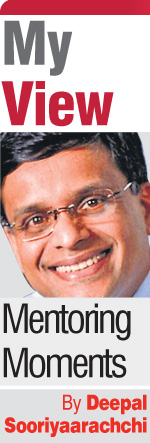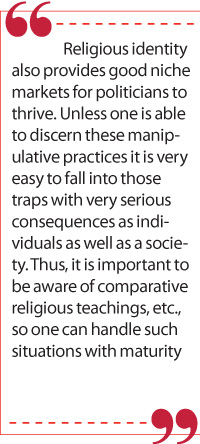Friday Feb 13, 2026
Friday Feb 13, 2026
Thursday, 10 June 2021 00:15 - - {{hitsCtrl.values.hits}}

Just think about it, how much of our daily activities are already dependent upon technology?
 About 70 or 80 years ago the convention in Sri Lanka was that a woman is literate enough if she could read a prescription (beheth seettuwa). But we have come a long way from that and now we pride ourselves saying that we are one of the most literate societies. According to published data by 2015 the youth literacy rate in Sri Lanka is around 98.8%
About 70 or 80 years ago the convention in Sri Lanka was that a woman is literate enough if she could read a prescription (beheth seettuwa). But we have come a long way from that and now we pride ourselves saying that we are one of the most literate societies. According to published data by 2015 the youth literacy rate in Sri Lanka is around 98.8%
Youth (15-24) literacy rate (%). Total is the number of people aged 15 to 24 years who can both read and write with understanding a short simple statement on their everyday life, divided by the population in that age group. Generally, ‘literacy’ also encompasses ‘numeracy’, the ability to make simple arithmetic calculations.
More recently the world started focusing on digital literacy rate and the estimated computer literacy rate of Sri Lanka is 32.0% and digital literacy rate is 49.5% for first six months in 2020.
However, it is apparent that we need higher literacy as a society in a number of other areas as well if we are to survive let alone to progress.
This is an effort to explore such areas where we need to improve literacy and obviously this article is open for discussion and critique.
Technology
Technology literacy is the ability to effectively use technology to access, evaluate, integrate, create and communicate information to enhance the learning process through problem-solving and critical thinking is a very popular definition (Wikipedia). If we apply this definition, we can understand how low we are placed in technology literacy. A little reflection on the level technology plays in our lives today, it is becoming essential to have a certain level of technological literacy. Just think about it, how much of our daily activities are already dependent upon technology?
Financial literacy
From the childhood until one dies, finance plays a significant role in one’s life. Yet the formal education system does not teach us about money and how to manage them. Maybe we get lessons on various other topics but not on finances. Unless a person studies in commerce stream I do not think the school syllabuses cover financial literacy. Most people get into difficulties more because of their financial illiteracy than not having money.
 Consumer literacy
Consumer literacy
What I mean is the ability to be discerning as a consumer and to be responsible as a consumer as to what choices to make and how to choose the real value of products and services we buy, etc. This eventually will be the fundamental building block of a sustainable earth system. In addition to know the rights one has as a consumer is also important aspect.
Ecological literacy
Eco-literacy is the ability to understand the natural systems that make life on earth possible. Eco-literacy is the power that comes from the knowledge and consciousness of how nature’s living systems operate (Wikipedia). Unfortunately, we have forgotten what we knew about ecology in our traditional knowledge system and the appreciation of it. Our heritage was built upon sustainability. What other civilisation had an irrigation system like ours where our Wewas are an entire eco system?
We knew the interdependence of plants and animals thus left a portion of a paddy field for birds to eat after harvesting. But with the increasing human activity and the complexity of them we have begun to impact environment seriously. It is very important for all citizens to know the impact human activities and what we use, etc, have on environment thus life in general. This needs to be common knowledge otherwise we will continue to hear some community leaders uttering words such as what is the purpose of oxygen?
Food literacy
This can be defined as understanding the impact of your food choices on your health, the environment, and our economy. Being food literate empowers us to make informed choices about food. With industrialisation and mass commercialisation food has become complex and an economic unit. Thus, rather than being good for humans as the primary requirement of provision of food, being good to commerce has taken precedence. As a result, some of the core values related to provision of food has gone away.
This leaves the consumer exposed to unhealthy food and food habits. Therefore, it is becoming increasingly important to recognise the various ingredients, methods of preparation, sourcing, storing, and merchandising of food items to ensure what one consumes is good and not harmful. This requires a high degree of literacy on this subject. For instance, various signs on labels mean so many different things.
Scientific literacy
Scientific literacy is the knowledge and understanding of scientific concepts and processes required for personal decision making, participation in civic and cultural affairs, and economic productivity (Wikipedia). We as a society seem to have very little scientific literacy or we seem to have very low appreciation of the importance and relevance of science. Though there are many students who learn science as a subject what appears to be missing is scientific thinking.
The way we approached COVID, amply demonstrated our lack of scientific literacy. Successive governments; post-independence haven’t used science in making some major policy decisions or if at all it was used more as an afterthought. Unless the society is scientifically literate it is not possible to introduce policy decisions that are scientific. It is easy to propagate myths when there is poor scientific literacy. We make decisions based on opinions rather than objective information.
This should not be wrongly understood as ignoring eastern wisdom that has an element of extra sensory realisations. But to approach things scientifically and to use available proven science to solve problems of the day, appreciating that we live in a far more complex interdependent era.
Political literacy
Political literacy can be defined as a set of abilities considered necessary for citizens to participate in a society’s government. It includes an understanding of how government works and of the important issues facing society, as well as the critical thinking skills to evaluate different points of view.
Although our media is full of political noise and almost all our life activities are embroiled or influenced by politics, even to the extent of getting a vaccination to survive a deadly pandemic, as a society we seem to be very poor when it comes to political literacy.
Obviously, rulers would prefer the status quo, since it is advantageous for them. Thus, there must be alternative space and media through which the people can get their political education. Without it a democratic society cannot progress.
This also should include the basic civil rights and responsibilities as well.
Media literacy
Media literacy, can be simply defined as the ability to access media messages, analyse and evaluate the accessed media from a critical point of view and develop one’s own point of view. As you can imagine this is so critical today with a plethora of different media overwhelming the person through a variety of media. With the advent of ICT and the mobile technology virtually any one can be a content provider.
As we receive news messages from various sources almost instantly even without any validity and verification, unless one has critical thinking it is inevitable that these news items are accepted on their face value. To verify news items and to be selective in accessing of news media is a very important capability that goes beyond basic literacy.
Mathematical literacy
Math literacy (also known as numeracy) means having the ability to problem-solve, reason and analyse information. Math literacy is the second key step for all students, beyond language literacy. It is the ability to use numbers to help solve real-world problems. The importance of this aspect of literacy is reflected by making it mandatory to pass mathematics at O/L. But I think our level of mathematical literacy as a nation is below the desired level. You may recall how once the number of students who failed in Maths at O/L the authorities brought down the pass mark. Not sure whether this was only for that year.
Spiritual literacy
Like many societies, religion plays a significant role in our society too. With ever-increasing complexities and challenges in life it is nothing but natural for one to turn towards various religious and spiritual approaches for solace. In such a situation it is very common for various tricksters to come up with propositions capturing those desperate as well genuine seekers.
Religious identity also provides good niche markets for politicians to thrive. Unless one is able to discern these manipulative practices it is very easy to fall into those traps with very serious consequences as individuals as well as a society. Thus, it is important to be aware of comparative religious teachings, etc., so one can handle such situations with maturity.
Aesthetic literacy
Though there is prevalence of various art forms, as a society we are yet to reach a level of deep appreciation of finer levels of them. Development of such refined appreciation of various art forms will make the members of society more stable emotionally and to be more creative. Rather than limiting the learning of aesthetic subjects to those who study humanities it should be widespread.
Emotional literacy
Emotional literacy is made up of the ability to understand your emotions, the ability to listen to others and empathise with their emotions, and the ability to express emotions productively. To be emotionally literate is to be able to handle emotions in a way that improves your personal power and improves the quality of life around you. Emotional literacy improves relationships, creates loving possibilities between people, makes co-operative work possible, and facilitates the feeling of community (Claude Steiner). Looking at the way we behave as a society, it is obvious we need to improve our emotional literacy.
This may look a very fancy wish list, but I sincerely believe a discussion on the need to broad base these aspects of literacy, is essential for us to progress as a society. What I have done is only the introduction of the key topics. Defining the scope and the methodologies to develop those respective literacies should be done by experts.